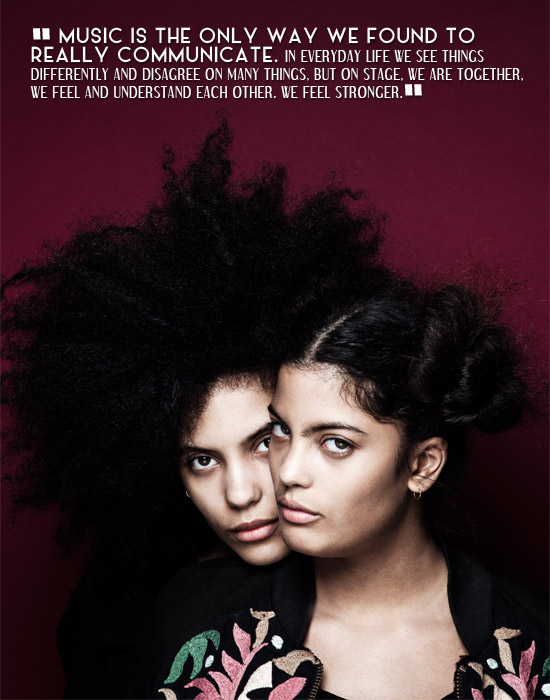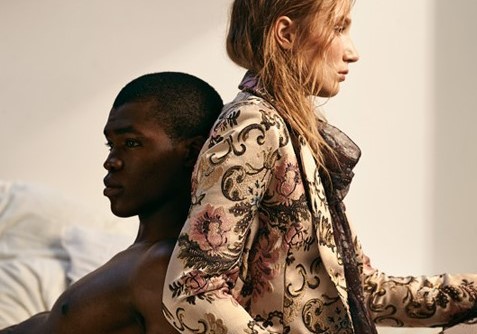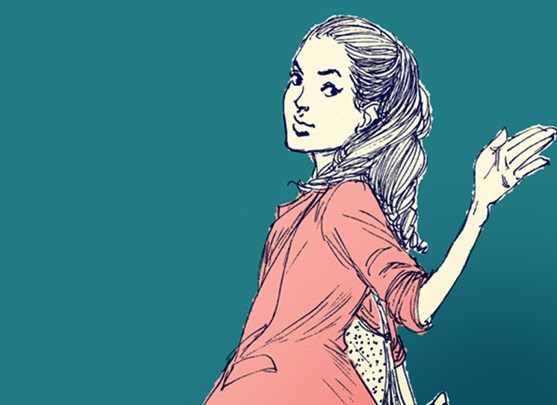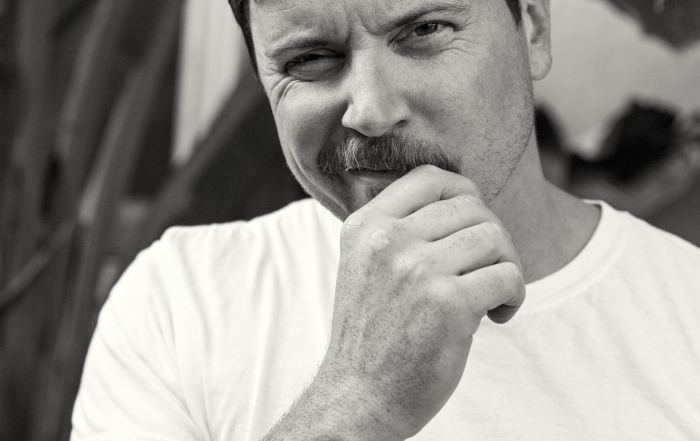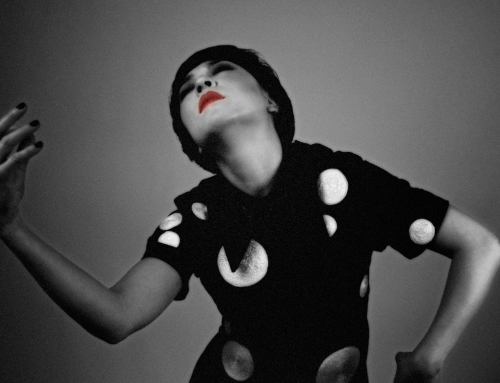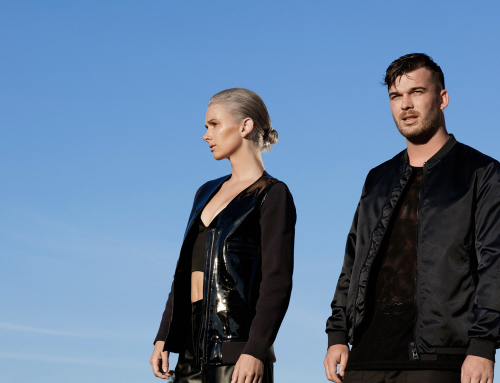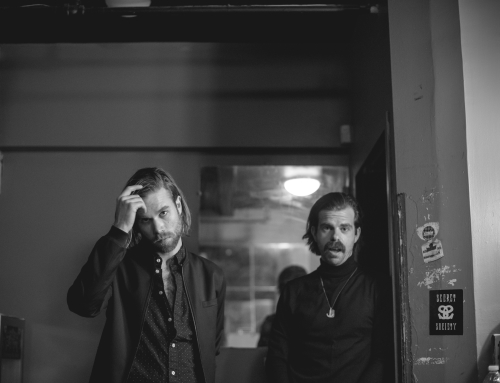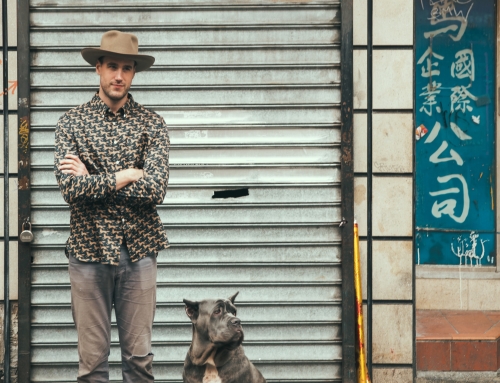There is something soulful verging on ethereal about the two voices that comprise Ibeyi. Inspired by the Yoruba chants of their ancestors, Ibeyi unites the Old World with the kinetic rhythm of contemporary city life, heard through the cadence of hip hop, jazz and electronic beats. Sisters Naomi and Lisa Kainde write songs about life, and the people and emotions that act as its axes. In tracks such as “River,” it’s about a desire for spiritual cleansing, while the toll of lost love—specifically on their mother—tugs at sentiment in “Mama Says.” There subject matter is personal, and in some ways, that only makes sense considering how their careers began.
“The day after my father died, I was 11. We were at his house in Barcelona, and I sat down on one of his cajons and started playing,” shares Naomi. “It was the first day I touched this instrument. The cajon chose me, more than I chose it.”
Daughters of famed Cuban percussionist Anda Diaz, while the 19-year old twins shared their house with music growing up, their skill set wasn’t something they learned directly from their father. “Our mother used to tell him to do 1/2 hour of our music homework every day while we were on vacation with him, and he never did,” recall the two fondly. “Instead we would go play on the beach.”
Though they might have skipped formal lessons, their youth was spent listening to the Yoruba chants of their ancestors in Cuba, a musical history that very much inhabits the band’s debut record. “We were going to a Yoruba choir with our mom, and we loved it so much, it came naturally in my compositions,” says Lisa.
Similarly, the duo’s father and his musical legacy too, shapes the sound of the album, acting as something of an extension of the late great percussionist’s oeuvre.
“Our father was one of the greatest conga players in the world. We wanted some people to remember him and others to discover him,” affirm the sisters together. “He’s like a king with no crown.” And so, his music lives on with every beat of the cajon.
With the release of their self-titled debut by XL Recordings this past February, Ibeyi has stepped onto the international scene as one of this year’s most impressive emerging bands. Hot off the release of their new album, we catch up with the girls to talk creative inspiration, Yoruba culture and what it means to be in a band with your sister.

Congrats on your debut album! How are you feeling, excited, a bit nervous?
Ibeyi: Thank you! Very excited. We hope people enjoy it as much as we enjoyed recording it.
We certainly did! You formed Ibeyi back in 2013, aside from the actual timeline, would you say this album feels like a long time coming, or does it actually feel more like the opposite, like everything is moving at an accelerated speed?
Ibeyi: It feels like it’s moving very fast. So fast we are just realizing we are going on tour and not going to be back home for more than one day in the next 2 months.
Your father, Anga Diaz, was a famous percussionist in Latin jazz; how did his career and his approach to the creative process, as well as to the business side of things, affect your own career in music?
Ibeyi: Our father was not into the business side of music. He thought only about creating and playing music with people he enjoyed and sharing some spiritual union. He had empty pockets when he died, after having worked almost everyday of his life since he was 17.
With music being a family affair for you both, growing up did you think you would end up creating an album together? Or were solo careers in music what you originally envisioned?
Lisa Kainde (LK): I never thought about a career, solo or with a band. I started to compose songs when I was 14 because Naomi was always partying, and I was bored at home. I realized I felt much better afterwards, so I kept on making songs, but it was only for myself.
Naomi Kainde (NK): I never thought about a career either. We were at music school, I did not like the academics and we started Ibeyi because Lisa was offered to do an EP, and I was certainly not going to let her do music without me.
That’s funny that you say that because my next questions is about sibling squabbles when maybe you didn’t want to hangout. Fighting as kids is inevitable, but on one occasion I understand your father was emotionally struck by the sight and cried after witnessing you two fight, later asking you both to connect with each other, rather than fight. Was music the connection that brought you two closer together?
Ibeyi: It’s true, he couldn’t stand the violence of our arguments and cried. We never forgot that. Music is the only way we found to really communicate. In everyday life, we see things differently and disagree on many things, but on stage, we are together, we feel and understand each other. We feel stronger.
I think you can hear that in your music, the strength of the bond. Being not only family, but twins, do you feel like working together is almost intuitive?
Ibeyi: It is. We don’t talk that much.
LK: I compose the melody, then Naomi finds the rhythm. We complete each other.
Ibeyi is derived from the word “ibeji” meaning twins in Yoruba. What inspired you to choose this name?
Ibeyi: “Ibeyi” is the Cuban way of saying Ibeji, the sacred twins. We are Cuban, we are twins, we’ve grown up listening to the Yoruba chants that are sung in Cuba…it was obvious for us to be named Ibeyi.
Makes sense. It seems like a fascinating culture. Are you hoping your music will draw more interest to it? Or is that more an unplanned bonus of the album becoming popular?
LK: Nothing was planned. When we went to play in Benin in December 2013, opening for the great Angélique Kidjo, we were anxious about how the Yoruba audience was going to react. We told them that we were the Cuban daughters of our common Dahomey ancestors, and they welcomed us with such warmth and pride, that we felt blessed and felt even stronger about drawing some interest to the Cuban-Yoruba culture.
The Yoruba culture is very spiritual, an element that seems to have influenced the new album, wouldn’t you say?
Ibeyi: Music is about sharing, giving, receiving, remembering, feeling we are not alone… if that’s what is called spirituality, then yes, spirituality is a big influence.
On that note, could you explain the story behind “River” and “Mama Says,” those two songs seem to really capture the album’s sense of spirituality.
LK: “Mama Says” is an early song. I felt powerless at the time because I didn’t know how to help my mom and at the same time, I was angry that she let herself feel so bad, so I wrote her a song hoping she would hear and also be happier. Everybody should have a song composed for them…I am waiting for someone to write me a song (laughing).
I especially like the video for “River,” it looks like you’re both washing your souls or being baptized.
LK: “River” is a song dedicated to Oshun, the deity of the river and fertility. It’s our mom’s orisha. We love the video directed by Ed Morris. We wanted a one take video. He came up with this idea of being under the water and singing as we come out of it, and we immediately realized that it was exactly what we wanted, and exactly what the song needed.
Love the video as well. How would you describe your head space while writing and recording this album, and how did that translate in terms of the album’s mood?
NK: The recording with Richard Russell was one of the best times in my whole life. I was so happy to go to the studio in the morning, I enjoyed every sound we found, every laugh, every moment we shared.
LK: With Richard, we learned to listen to music differently, we were super excited and super concentrated at the same time. We can’t wait to do another one!
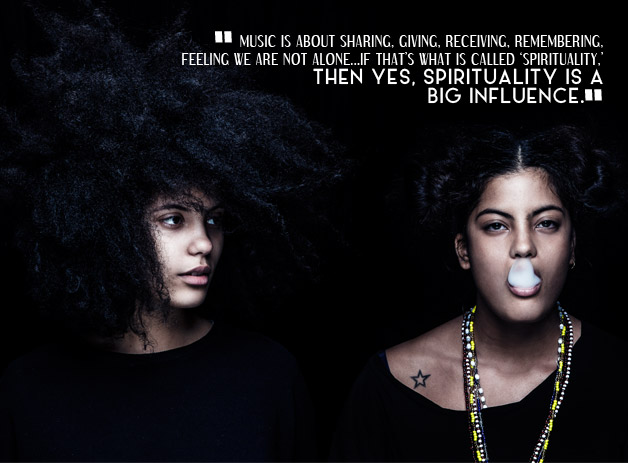
Either can we! If you had to identify a central theme or point of inspiration for this album, what would it be?
Ibeyi: Love, life and death, hope.
Concise summary. You grew up in Paris, which must have been a beautiful place to grow up. Were you quite immersed in the artistic scene there as youths, and even still today?
Ibeyi: Yes, we were lucky to have a family that needs to be surrounded not only by music, but also very interested by painting, photography and dance.
How often would you travel to visit Cuba growing up? Did it feel like a second home, a second culture next to Paris?
Ibeyi: We spent all of our summer holidays in Cuba with our family. We are both Cuban and French, our music is really a mix of both those Cuba/Yoruba and European influences and cultures. We are a mix, our music is a mix.
About that mix you hear on the album, how do you see it fitting into mainstream music? Do you see your debut album as radio-friendly, or is that not a high priority?
Ibeyi: We didn’t think of radio when we were recording, we were concentrating on finding our sound, on making songs we liked. Richard Russell never asked us for music to fit radio, nor did our label XL Recordings.
So it was a non-priority, then?
Ibeyi: Of course we are happy when [the] radio play[s] our songs so that people who don’t read newspapers and are not internet music addicts can discover it.
How would you like to continue to cultivate your sound? Playing the album live while on tour will likely change up your style a bit.
Ibeyi: We are starting the tour now, long tour, we’ll see how much it changes our sound, everything changes all the time anyway. We change, our songs will certainly too.
Might be a little too soon to ask this, but is another album already in the works?
Ibeyi: We already have some melodies and ideas. It’s good to keep moving.









